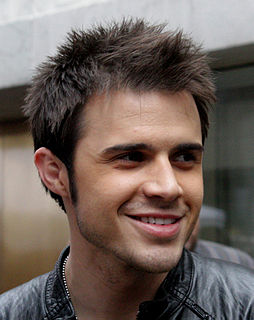A Quote by Alison Hawthorne Deming
I grow very impatient with prose writers who don't pay attention to the cadence of the sentence. If you start as a poet, you're wooed by the music of language; you want to put that into your practice.
Related Quotes
You have to seduce the reader, manipulate their mind and heart, listen to the music of language. I sometimes think of prose as music, in terms of its rhythms and dynamics, the way you compress and expand the attention of a reader over a sentence, the way the tempo pushes you towards an image or sensation. We want an intense experience, so that we can forget ourselves when we enter the world of the book. When you are reading, the physical object of the book should disappear from your hands.
Pay attention to your friends; pay attention to that cousin that jumps up on the picnic table at the family reunion and goes a little too 'nutty,' you know what I mean? Pay attention to that aunt that's down in the basement that never comes upstairs. We have to pay attention to our friends, pay attention to your family, and offer a hand.
There are some simple maxims which I think might be commended to writers of expository prose. First: never use a long word if a short word will do. So, if you want to make a statement with a great many qualifications, put some of the qualifications in separate sentences. Third: do not let the beginning of your sentence lead the reader to an expectation which is contradicted by the end.
If your skin is crawling, pay attention. If something doesn’t feel right, pay attention. If the hairs on the back of your neck prickle, if your gut clenches up, if a wave of wrongness washes over you, if your heart starts beating faster, pay, pay, pay attention. Do not second-guess yourself or rationalize anything that impedes your safety. Our instincts are the animal inside of our humanness, warning us of danger.
From the simplest lyric to the most complex novel and densest drama, literature is asking us to pay attention. Pay attention to the frog. Pay attention to the west wind. Pay attention to the boy on the raft, the lady in the tower, the old man on the train. In sum, pay attention to the world and all that dwells therein and thereby learn at last to pay attention to yourself and all that dwells therein.
You have to rise up to that state of thoughtless awareness where you grow spiritually. If you are not in thoughtless awareness, you cannot grow in your spirituality. So it's very important to see where is your attention. Where are you putting your attention? If the attention could be controlled then things will be all right.
People who get implants, it's so depressing, you know... People - I don't know. The route of that, you know, maybe they want more love or attention, or what it is, but they always go for the most obvious place, you know? Here... Well if you really want more attention, why not get them in your eyes? And then move your eyes down to where your nipples used to be, put your breasts up on your head, everybody will pay attention!





































